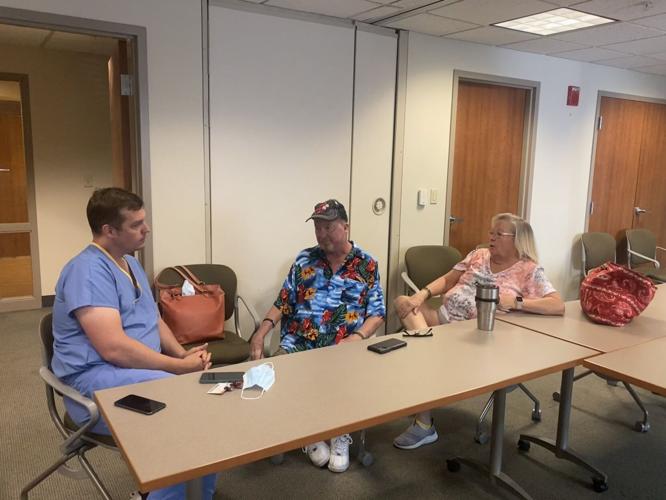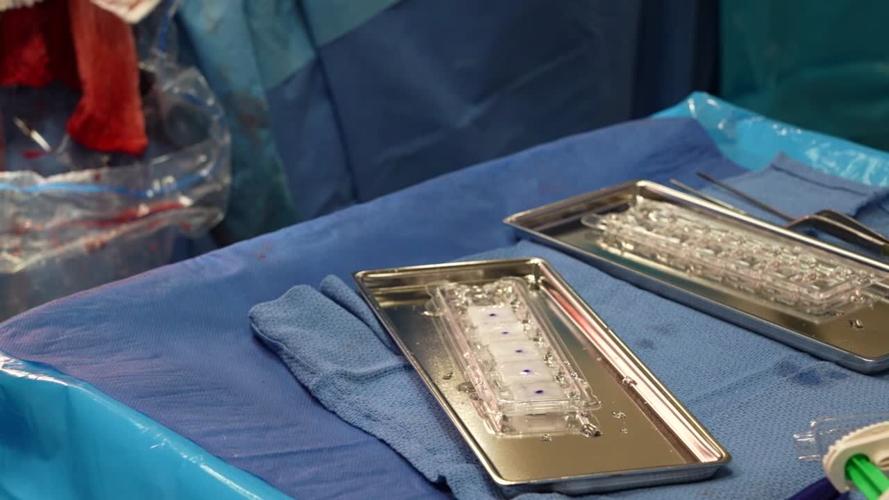LOUISVILLE, Ky. (WDRB) -- Treating an aggressive brain tumor that reoccurs is an enormous challenge, but a neurosurgery team at UofL Health recently used a new approach to treat a patient who is now making a promising recovery.
Tom Shober, who lives in Louisville with his wife of 33 years, Tina, said they learned he had cancer when he fell and hit his head in March 2021. Quickly, he was scheduled for his first brain surgery.

Picture shows Tom and Tina Shober. Photo courtesy of Tina Shober.
"When I first got the prognosis ... I thought, 'Well, this is it,'" Tom Shober said.
His wife held a rock with the word "Believe" on it during the interview with WDRB News, emotional about the hardship her husband's cancer battle has been.
"It was hard," she said. "It was really hard. It's still hard."
The couple kept the faith through 2021 despite another hospitalization in October for a heart stent and a continued battle with COPD.
"You go through phases, at first, you're discouraged. You're depressed," Tom Shober said. "Then, you kind of get angry. You know, 'Why? Why me? Am I gonna die tomorrow?' I mean, there's so many unknowns."
Tom Shober's team of doctors proposed for a new form of radiation technology: GammaTiles. Recently approved by the U.S. Food and Drug Administration, GammaTile Therapy — which stands for Surgically Targeted Radiation Therapy (STaRT) — is designed to delay tumor regrowth while protecting healthy brain tissue, according to a news release from UofL Health. It can also eliminate the need for repeated radiation treatments.

This undated photo provided by UofL Health shows GammaTiles which are embedded with a radiation source and implanted in the last five minutes of tumor removal surgery. (UofL Health)
GammaTiles are about the size of a postage stamp, embedded with small radiation sources and implanted in the last five minutes of brain tumor removal surgery. It then targets tumor cells in the area where the tumor is most likely to recur. After the radiation has been delivered, the tile naturally resorbs.
"I was ready to dive in, because what do I got to lose?" Tom Shober said.
His wife was on the same page.
"We would've tried anything," Tina Shober said. "We were just like, 'Let's do it. Let's just do it.'"

This undated photo provided by UofL Health shows a neurosurgery team preparing to perform surgery on a brain tumor patient using GammaTile technology. (UofL Health)
On Aug. 1, UofL Health neurosurgeon Dr. Brian Williams and his team performed the surgery after planning with radiation oncologist Dr. Shaio Woo.
"From the perspective of the operation, it's relatively simple," Williams said.
First, remove the cancer tissue. Then, place the GammaTiles, add necessary plates and, finally, stitch him back up.
The surgical team became the first in Kentucky to use GammaTile Therapy.
"This is just one more option for getting the best care you possibly can in Kentucky," Williams said.
Woo said this is just the beginning.
"In fact, we may extend its use," he said. "See, now, we only use it for so called metastatic tumor, as I've described. But we have been thinking about using it for other kinds of brain tumors. And so this is all in the discussion."
As of Tuesday, it's too soon to say if Tom Shober is in remission. But it marks a turning point in his journey.
"Take one day at a time, one foot in front of the other," he said.
And it's a possibly a turning point for cancer treatment in Kentucky.
"I think this is hope," said Ally Schaber, Tom Shober's nurse practitioner. "You know, there's so much more that needs to be done for cancer patients, and we want to keep being on the cutting edge to have what's best out there to offer for our patients."
Copyright 2022 WDRB Media. All Rights Reserved.
















